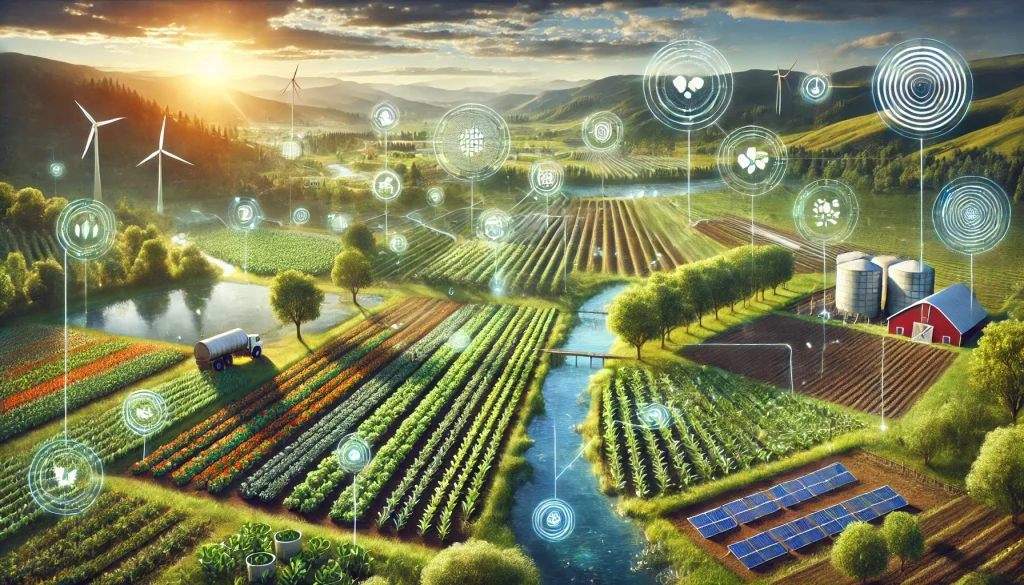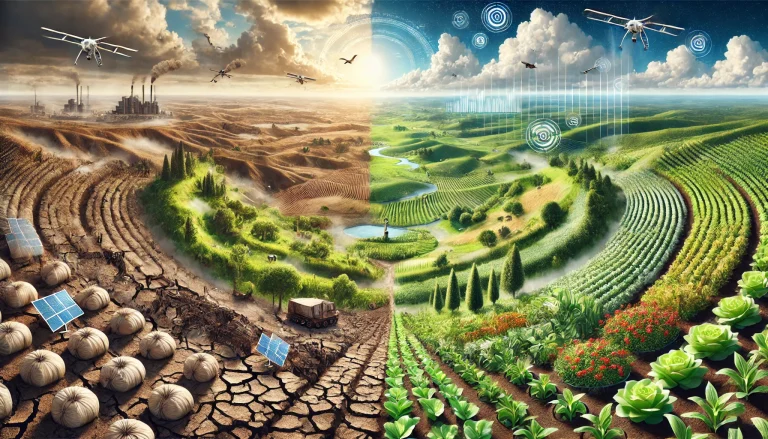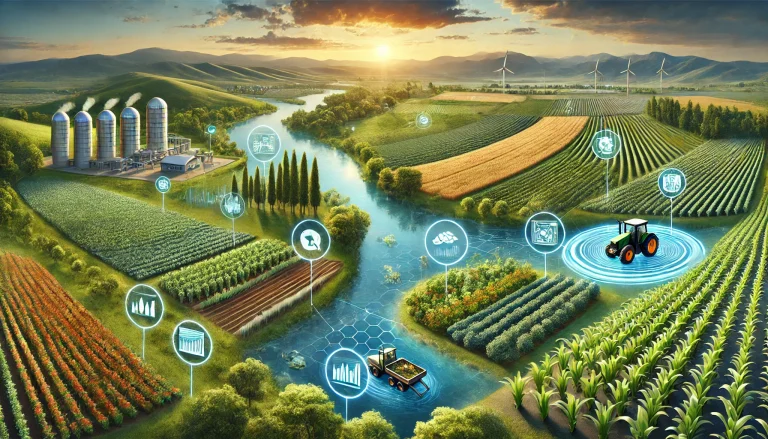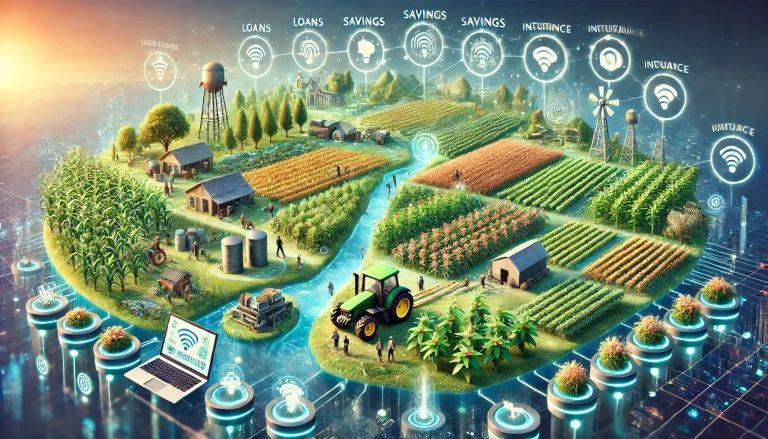Problem Statement:
The farming industry has become increasingly dependent on chemical fertilizers to boost crop yields and meet the growing global demand for food. While these fertilizers have contributed significantly to agricultural productivity, their overuse has led to a range of environmental problems that threaten the sustainability of farming practices. Chemical fertilizers, primarily composed of synthetic nitrogen, phosphorus, and potassium, are often applied in excessive quantities, far beyond what plants can absorb. This overuse results in the leaching of excess nutrients into the soil, leading to soil degradation and a reduction in soil fertility over time. Additionally, runoff from fields treated with chemical fertilizers contaminates water bodies, causing eutrophication, which depletes oxygen levels in aquatic ecosystems and leads to the creation of “dead zones” where marine life cannot survive. The disruption of local ecosystems is further compounded by the imbalance in soil microbiota, which can reduce biodiversity and harm beneficial organisms. Long-term dependency on synthetic fertilizers also increases the vulnerability of crops to pests and diseases, as the natural resilience of the soil is compromised. This reliance on chemical inputs creates a cycle where farmers must continually increase their use of fertilizers to maintain yields, further exacerbating environmental degradation. Addressing this issue requires a shift toward more sustainable farming practices that balance productivity with environmental stewardship.
Pain Points:
- Soil Degradation: Overuse of chemical fertilizers depletes soil nutrients and reduces long-term fertility.
- Water Pollution: Runoff from fertilizer-treated fields contaminates water bodies, causing eutrophication and dead zones.
- Ecosystem Disruption: Excessive fertilizer use disrupts local ecosystems, harming biodiversity and beneficial organisms.
- Increased Pest and Disease Vulnerability: Reliance on chemical fertilizers can weaken soil health, making crops more susceptible to pests and diseases.
- Nutrient Imbalance: Overapplication of synthetic nutrients can lead to nutrient imbalances in the soil, affecting crop health and yield quality.
- High Input Costs: Continuous reliance on chemical fertilizers increases costs for farmers, reducing profitability and sustainability.
- Greenhouse Gas Emissions: The production and application of chemical fertilizers contribute to greenhouse gas emissions, exacerbating climate change.
- Soil Acidification: Repeated use of certain fertilizers can lead to soil acidification, further degrading soil quality.
- Loss of Soil Microbiota: The disruption of soil microbiota due to chemical inputs reduces soil biodiversity and resilience.
- Dependency Cycle: Farmers become trapped in a cycle of dependency on chemical fertilizers, leading to long-term environmental and economic challenges.

Future Vision:
The future of farming must involve a transition toward more sustainable practices that reduce dependency on chemical fertilizers while maintaining productivity and food security. This vision includes the development of a digital platform that provides farmers with tools and resources to implement sustainable nutrient management practices. The platform would offer precision agriculture technologies that enable farmers to apply fertilizers more efficiently, reducing waste and minimizing environmental impact. It would also promote the use of organic fertilizers, composting, and other soil-enriching practices that improve soil health and fertility over the long term. Additionally, the platform would provide access to real-time soil monitoring systems, allowing farmers to tailor their fertilizer applications to the specific needs of their crops and soil conditions. Education and training programs offered through the platform would help farmers adopt integrated nutrient management practices that combine the benefits of chemical and organic inputs. By fostering collaboration between farmers, agronomists, and environmental organizations, the platform would support the development of region-specific strategies for sustainable fertilizer use. Partnerships with government agencies and agricultural institutions would ensure that farmers receive the necessary support, incentives, and policy guidance to transition to more sustainable practices. Ultimately, this platform would help create a farming system that balances productivity with environmental sustainability, reducing the negative impacts of chemical fertilizers while enhancing soil health and resilience.
Use Cases:
- Precision Fertilizer Application: Farmers use the platform to apply fertilizers more efficiently, reducing waste and environmental impact.
- Organic Fertilizer Integration: The platform promotes the use of organic fertilizers and composting to improve soil health and reduce reliance on synthetic inputs.
- Soil Monitoring Systems: Farmers access real-time data on soil conditions, enabling tailored fertilizer applications based on crop and soil needs.
- Integrated Nutrient Management: The platform offers resources and training on combining chemical and organic inputs for optimal soil health and productivity.
- Environmental Impact Assessments: The platform provides tools for assessing the environmental impact of fertilizer use and identifying opportunities for improvement.
- Greenhouse Gas Reduction Strategies: Farmers receive guidance on reducing greenhouse gas emissions associated with fertilizer production and application.
- Cost Management Tools: The platform offers tools to help farmers manage input costs and improve profitability while adopting sustainable practices.
- Biodiversity Enhancement: The platform provides resources for enhancing soil biodiversity through sustainable nutrient management practices.
- Farmer Collaboration and Knowledge Sharing: The platform fosters a community where farmers can share experiences and best practices for sustainable fertilizer use.
- Policy Advocacy and Support: The platform supports advocacy efforts for policies that encourage sustainable fertilizer use and provide incentives for farmers.
Target Users and Stakeholders:
Target Users:
- Farmers seeking to reduce their dependency on chemical fertilizers and adopt sustainable nutrient management practices.
- Agricultural cooperatives and organizations promoting sustainable farming methods.
- Agribusinesses interested in reducing the environmental impact of their supply chains.
Stakeholders:
- Government agencies responsible for agriculture, environmental protection, and climate change mitigation.
- NGOs working on sustainable agriculture, soil health, and water conservation.
- Technology companies developing precision agriculture tools and sustainable farming solutions.
- Environmental organizations focused on biodiversity conservation and ecosystem restoration.
- Consumers interested in supporting environmentally responsible and sustainably produced food.
Key Competition:
- Indigo Ag: Focuses on microbial seed treatments, carbon sequestration, and regenerative practices to improve soil health and sustainability.
- Farmers Business Network (FBN): Provides data-driven insights and tools to help farmers optimize their practices and reduce environmental impact.
- Pivot Bio: Develops microbial nitrogen solutions that reduce the need for synthetic nitrogen fertilizers, promoting sustainable nutrient management.
- Sustainable Harvest International (SHI): Works with farmers to promote sustainable agriculture practices that reduce reliance on chemical inputs.
- AgroCares: Provides soil and crop nutrient testing services, helping farmers make informed decisions about fertilizer use.
Products/Services:
- Precision Fertilizer Application Tools: Technologies that enable efficient and targeted fertilizer application, reducing waste and environmental impact.
- Organic Fertilizer Solutions: Resources and products that promote the use of organic fertilizers, composting, and other sustainable soil-enriching practices.
- Soil Monitoring and Analysis Systems: Real-time soil monitoring tools that provide data on soil conditions, enabling tailored nutrient management.
- Integrated Nutrient Management Resources: Guides and training on combining chemical and organic inputs for optimal soil health and productivity.
- Environmental Impact Assessment Tools: Technologies for assessing the environmental impact of fertilizer use and identifying opportunities for improvement.
- Greenhouse Gas Reduction Strategies: Solutions for reducing emissions associated with fertilizer production and application.
- Cost Management Platforms: Tools that help farmers manage input costs and improve profitability while adopting sustainable practices.
- Biodiversity Enhancement Services: Resources for enhancing soil biodiversity through sustainable nutrient management practices.
- Farmer Collaboration Platforms: Spaces for farmers to share knowledge and collaborate on best practices for sustainable fertilizer use.
- Policy Advocacy and Support Services: Resources and campaigns advocating for policies that encourage sustainable fertilizer use and provide incentives for farmers.
Active Startups:
- Pivot Bio: Develops microbial nitrogen solutions that reduce the need for synthetic nitrogen fertilizers, promoting sustainable nutrient management.
- Trace Genomics: Provides soil health data and traceability solutions to ensure sustainable farming practices are used.
- Bioceres: Focuses on developing sustainable agricultural solutions, including biofertilizers and biostimulants that reduce the need for chemical inputs.
- Compost Crew: Offers composting services and products that promote organic waste recycling and soil health improvement.
- AgroCares: Provides soil and crop nutrient testing services, helping farmers make informed decisions about fertilizer use.
Ongoing Work in Related Areas:
- Research on microbial and bio-based fertilizers that reduce the need for synthetic chemical inputs.
- Development of precision agriculture technologies that optimize fertilizer application and reduce environmental impact.
- Soil health initiatives that promote sustainable farming practices and the use of organic soil amendments.
- Water conservation programs aimed at reducing nutrient runoff and protecting water bodies from pollution.
- Policy advocacy efforts to encourage the adoption of sustainable nutrient management practices and provide incentives for farmers.
Recent Investment:
- $150 million investment in Pivot Bio in 2023 to scale their microbial nitrogen solutions and reduce reliance on synthetic fertilizers.
- $100 million raised by Trace Genomics in 2022 to enhance their soil health data and traceability solutions for sustainable farming.
- $75 million in funding for Bioceres in 2023 to develop and commercialize biofertilizers and biostimulants that reduce chemical input dependency.
- $50 million in venture capital for Compost Crew in 2024 to expand their composting services and promote organic waste recycling.
- $35 million invested in AgroCares in 2023 to enhance their soil and crop nutrient testing services and support sustainable nutrient management.
Market Maturity:
The market for sustainable nutrient management practices and technologies is maturing as awareness of the environmental impacts of chemical fertilizers grows. Farmers, agribusinesses, and consumers are increasingly recognizing the need to reduce reliance on synthetic inputs and adopt more sustainable farming methods. Investments in precision agriculture, organic fertilizers, and microbial solutions are rising, driven by the demand for practices that balance productivity with environmental stewardship. Governments and international organizations are also playing a key role in promoting sustainable nutrient management through grants, subsidies, and regulatory support. While challenges remain in scaling these practices and reaching all farmers, particularly in regions with heavy reliance on chemical inputs, the market is poised for continued growth. As more farmers adopt sustainable practices and new technologies emerge, the agricultural sector will become more resilient, efficient, and environmentally responsible, capable of meeting global demand while protecting the planet’s resources.
Summary:
The farming industry heavily relies on chemical fertilizers to boost crop yields. While these fertilizers can increase productivity, their overuse leads to significant environmental problems, including soil degradation, water pollution, and the disruption of local ecosystems. Moreover, the long-term dependency on synthetic fertilizers can reduce soil fertility and increase the vulnerability of crops to pests and diseases. A digital platform that supports sustainable nutrient management could help farmers reduce their reliance on chemical fertilizers while maintaining productivity. By providing tools for precision application, organic fertilizer integration, and soil monitoring, the platform would help create a farming system that balances productivity with environmental sustainability. As the market for these solutions continues to mature, driven by increased investment and awareness, there is a significant opportunity to reduce the environmental impact of farming and promote sustainable agricultural practices.



